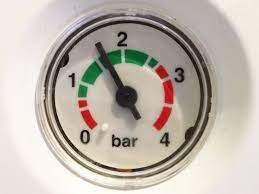There’s nothing quite like a cosy home with a warm cup of tea and a well-functioning boiler. That is, until you notice that your boiler’s pressure seems to have gone on a rollercoaster ride, leaving you scratching your head in confusion.
Don’t worry; you’re not alone in this puzzling situation. Many homeowners have faced the enigma of a boiler that keeps losing pressure. In this blog post, we’ll delve into the reasons behind this mystery and try to guide you through some simple steps to solve it. So, grab your detective hat and let’s get started!
The Basics of Boiler Pressure
Before we unravel the mysteries of pressure loss, let’s cover the basics. Your boiler operates under a specific pressure to ensure efficient heating and water flow throughout your home. Typically, this pressure should be around 1 to 1.5 bar, which is the sweet spot for optimal performance.
The Great Pressure Vanishing Act
Now that we’ve got the pressure gauge in our sights, let’s explore the reasons why it keeps taking a nosedive:
- Leaky Business
Ah, leaks – the bane of a homeowner’s existence. Just like a mischievous gremlin, a leak can cause your boiler’s pressure to drop faster than a roller coaster. It might be a faulty radiator valve, a loose connection, or even a pinhole in the pipework. But don’t fret; this is one case where you can save the day by calling us here at Manta Heating and Renewables to track down and seal those leaks.
- Bleeding Radiators
Radiators can be a tad dramatic at times. They might throw a hissy fit if they have trapped air inside them. This trapped air can lead to fluctuating pressure levels. A good sign that the radiator needs to be bled is that the top of the radiator is cold or at least significantly cooler than the bottom. But fear not, for you can put on your superhero cape and bleed the radiators! It’s as simple as turning a radiator key to release the air and restore harmony to your heating system, just remember to top the system pressure back up to around 1.0 to 1.5 bar after bleeding the radiators, all the time you are bleeding radiators, the system pressure is dropping too.
- Expansion Conundrums
Your boiler is a clever contraption that heats water, and as we all know, heated things tend to expand. Sometimes, the expansion of water within the system can lead to a pressure increase. But once the water cools down, it contracts, causing the pressure to drop. It’s a bit like a bungee jump for water molecules! To tackle this, you might need to top up the pressure occasionally to keep things stable, just remember that the best time to top up the pressure is when the system is cold.
The Top Hat Detective Work
Now that we’ve unmasked the possible culprits behind your vanishing pressure, let’s put on our top hats and engage in some detective work to solve the mystery:
- Check for Leaks
Grab your magnifying glass – or, you know, just keep an eye out for any visible leaks around your boiler and radiators. If you spot a dripping pipe or a suspicious puddle, it’s time to call in the experts at Manta Heating and Renewables.
- Bleed the Radiators
No garlic is required for this task! To release trapped air from your radiators, locate the radiator valve, grab your radiator key (or a suitable tool), and turn it counterclockwise. You’ll hear a satisfying hiss as the air escapes. Once the water starts coming out, you’ve successfully bled the radiator. Repeat for all the radiators in your home.
- Re-pressurize
If your boiler’s pressure is still playing tricks on you, it might be time for a little TLC. Most modern boilers come equipped with a filling loop that allows you to top up the pressure. Consult your boiler’s manual for the specific procedure, but it generally involves turning off the boiler, connecting the filling loop, and opening the valves until the pressure gauge reaches the desired level. If you can’t find any information on re-pressurising your boiler in the boiler manual, check out YouTube at the link below https://www.youtube.com/shorts/ZFiV816zmuo
Prevention: The Hero’s Guide
Now that you’ve solved the case of the disappearing pressure, it’s time to become a hero of prevention:
- Regular Check-ups
Just like an annual doctor’s visit, your boiler needs regular check-ups too. Schedule a Manta Care Annual Boiler Service to catch any leaks or issues before they become full-blown mysteries.
- Keep an Eye Out
Make it a habit to keep an eye on your pressure gauge. If you notice sudden drops or spikes, it’s time to put on your detective hat once again.
- Radiators Need Love Too
Don’t forget about your radiators! Bleeding them at the beginning of each heating season can prevent trapped air from causing pressure hiccups.
In Conclusion
As we bid farewell to the pressure plunge predicament, remember that your boiler is like a reliable friend – it might have its quirks, but with a little understanding and care, it’ll keep you warm and cosy for years to come. So, the next time you hear a mysterious gurgle or spot a pressure drop, channel your inner detective, and you’ll be well-equipped to solve the case and save the day. Happy heating, dear homeowners!
Remember, while we’ve tried to make the information here as accurate as possible, boiler systems can vary, and it’s always a good idea to consult with a professional if you’re unsure about any aspect of your boiler’s performance. Give us a call here at Manta Heating and we will be happy to help.
Stay warm and keep those pressure mysteries at bay!

Leave a Reply